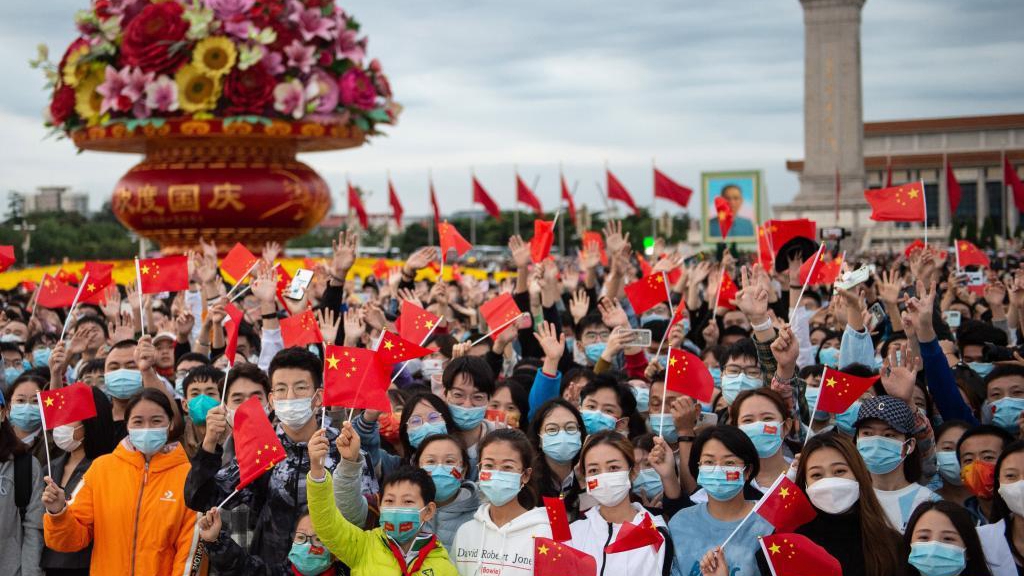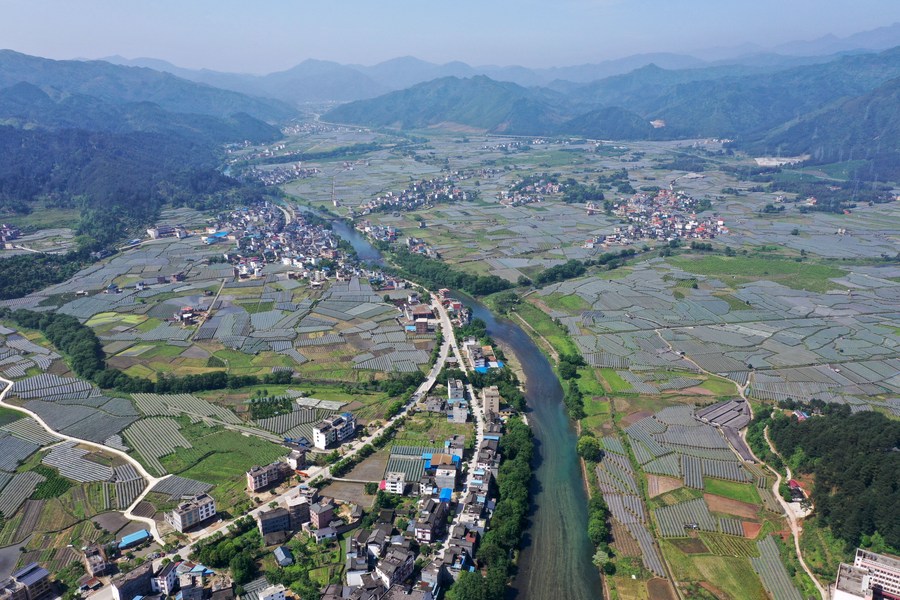
A flag-raising ceremony to celebrate the 72nd anniversary of the founding of the People's Republic of China is held at the Tian'anmen Square in Beijing, capital of China, October 1, 2021. /Xinhua
A flag-raising ceremony to celebrate the 72nd anniversary of the founding of the People's Republic of China is held at the Tian'anmen Square in Beijing, capital of China, October 1, 2021. /Xinhua
Editor's note: Alessandro Golombiewski Teixeira is a National Thousand Talent distinguished professor of public policy at the School of Public Policy and Management, Tsinghua University, and a professor of international business at Schwarzman College in Tsinghua. He is a former special economic advisor to the president of Brazil and a former Brazilian minister of tourism, and minister of development, industry and foreign trade. He was also president of the World Investment Association (WAIPA). The article reflects the author's opinions, and not necessarily those of CGTN.
In 2018, Chinese President Xi Jinping first proposed that "people's happiness is the greatest human right." People's well-being has always been the goal of the Communist Party of China (CPC). As a professor of Public Policy and Management at Tsinghua University, I have been working, living, and traveling in China for several years, where I have personally experienced and witnessed the happy life of Chinese people. Their happiness springs from China's rapid transformation, which can be seen in the details.
The greatest thing about living in China is the convenience. Ubiquitous shared bikes, rail transportation, high-speed trains and airplanes can take me anywhere at any time.
The highly developed e-commerce network helps me to buy and receive whatever I need quickly. Whether I want to drink tea from Hangzhou, Zhejiang Province, eat snacks from Shanxi Province, or buy handicrafts from Sichuan Province, all I need to do is tap on my phone and it will be delivered to my home in one to two days.
"Fast" is the buzzword of contemporary China. Since the era of reform and opening up, China's economy has grown by leaps and bounds, driving the country's rise at an unprecedented speed.
The latest example of "China's speed" is the construction of Leishenshan (Thunder God Mountain) and Huoshenshan (Fire God Mountain) Hospital in a short period of time in the early days of the COVID-19 pandemic. The fast-paced development and expansion reflects a society-wide desire for progress, development, the growth of the middle-class, and a maturing consumer market. In China, there is an inextricable link between the pursuit of "speed" and the improvement of people's lives.
Happiness in China is not only in the prosperous metropolises, but also in the vast rural areas. As China steps up its rural revitalization strategy, it beefs up rural infrastructure and public services, while building livable and beautiful villages. Farmers who were once plagued with poverty and diseases find themselves on the road to happiness.
Guilin, in south China's Guangxi Zhuang Autonomous Region, is a world-famous scenic tourist city for its beautiful landscapes. When I visited Yangshuo County in Guilin, I was impressed by the good blend of modern civilization and traditional culture.
Under the policy of the local government, cadres have led the people to create a new four-pronged rural tourism development strategy of "tourism + industry + ecology + culture." Many locals who left their jobs have come back to do business - rafting, growing fruits, running farm caravans, as well as repairing old houses and running bed and breakfasts (B&Bs). A number of special old houses and B&Bs have emerged in the village, breathing new life into old houses that carry historical memories.
Relying on the tourism advantages of Yangshuo, villagers have very well tapped into rural leisure tourism, all of them becoming rich and built new houses. They have also been driven by the local Party branches to change their mindset, production methods, living environment and stereotypes. I saw local residents leaving their doors unlocked at night, and they told me that this sense of security and trust enhanced their sense of well-being.

A view of Ziyuan County in south China's Guangxi Zhuang Autonomous Region, April 29, 2021. /Xinhua
A view of Ziyuan County in south China's Guangxi Zhuang Autonomous Region, April 29, 2021. /Xinhua
Confucius, the great sage of China, said, "what tortures people is inequality rather than scarcity of labor forces. What gnaws their souls is chaos instead of poverty." The Chinese people have not only solved the problems of "scarcity" and "poverty," but are now making great strides toward "equality" and "security." The CPC plans to achieve basic public service parity by 2035, and by 2050, the basic realization of common prosperity for all people will be achieved, and the Chinese people will enjoy a happier and more comfortable life."
In 2021, the Chinese government supports Zhejiang Province as a national model zone for common prosperity. Equitable employment opportunities are one of the important prerequisites for achieving common prosperity.
In Taizhou, Zhejiang Province, I saw the government provide high-quality non-agricultural employment to farm-based villages. By introducing whole chains of non-polluting labor-intensive industries and making full use of unused land or houses in villages to build common wealth workshops, the government delivers projects to villages, jobs to households and skills to people, driving up the employment and income of villagers. A villager in her 50s told me that she worked right at home, making money and taking care of her family.
In order to achieve fair employment opportunities, Zhejiang Province also launched a high-quality farmer cultivation program in an effort of making the "cake" bigger; improving the training of skills suitable for the employment of migrant workers and training of new occupations and new industries. The program has focused on farmers' entrepreneurship, which guided farmers in joining various businesses to cooperate in entrepreneurship. It encourages the growth of shared labor and multi-channel flexible employment, and farmers are more likely to be employed in domestic service, elderly care and other fields. The above measures helped establish a long-term mechanism to fix the lack of opportunities and resources for low-income groups.
These stories are played out every day in various parts of China. I met different people but they have the same smiling faces in different provinces like Yunnan, Jiangsu, Fujian, Guangdong, Hebei and others. I have learned during this time in China that development can be achieved with social and economic inclusion. The Chinese people have driven China's rapid rise and reaped its benefits. They will gradually bridge the differences in quality of life in the future. That'll hopefully lead to happier and better lives.
(If you want to contribute and have specific expertise, please contact us at opinions@cgtn.com. Follow @thouse_opinions on Twitter to discover the latest commentaries in the CGTN Opinion Section.)

